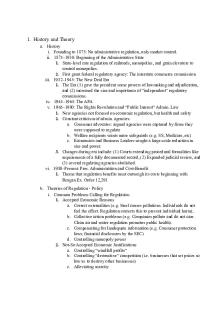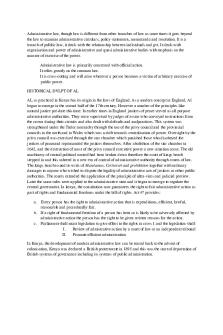Panama Refining Co. v. Ryan Administrative Law 2020 PDF

| Title | Panama Refining Co. v. Ryan Administrative Law 2020 |
|---|---|
| Course | Administrative Law |
| Institution | Touro College |
| Pages | 2 |
| File Size | 67.8 KB |
| File Type | |
| Total Downloads | 7 |
| Total Views | 121 |
Summary
Casebook Brief Notes from Casebook Homework in Administrative Law...
Description
ADMINISTRATIVE LAW FALL 2020 Panama Refining Co. v. Ryan —-> It is a violation of the separation of powers for Congress to delegate law-making authority to the President without imposing standards or rules limiting that authority. Facts: Congress enacted a provision in the National Industrial Recovery Act that gave the President the power to prohibit the transportation of petroleum products in excess of the amount permitted by state law. Based on this provision, the President promulgated an Executive Order making such a prohibition. The Oil Refiners (P) brought suit to enjoin government officials from enforcing the Executive Order and implementing regulations. The district court granted the injunction, but the court of appeals reversed. Issue: May Congress delegate unrestricted law-making authority to the President? Decision and Rationale: (Hughes, J.) No. It is a violation of the separation of powers for Congress to delegate law-making authority to the President without imposing standards or rules limiting that authority. The law at issue contains nothing as to the circumstances and conditions under which the transportation of petroleum products should be forbidden. Nor was the President required to make any factual findings prior to issuing the prohibition. Rather, Congress simply left the matter to the President, without standard or rule, to be dealt with as he pleased. The Congress is not permitted to abdicate to others the essential legislative functions with which it is vested. The Constitution is flexible enough to allow Congress to assign to certain administrative instrumentalities the ability to make subordinate rules —within prescribed limits—and to make certain factual determinations to which legislative enactments will apply. However, if our constitutional system is to be maintained, the necessity of administrative authority cannot override the limitations on congressional authority to delegate. If we were to hold the legislation in question valid,
Congress would be free to delegate authority at will to the President, another officer, or an administrative body. The delegation of authority was unlawful and invalid. Reversed. Analysis: Not yet a factor in this case was the rise of administrative agencies and the tremendous power that Congress entrusted to these agencies. The drafters of the Constitution had carefully separated the power of the government into three more-or-less competing branches and implemented a system of checks and balances to limit government power. The delegation of authority to a single agency that is insulated from political accountability is convenient, but the lack of checks and balances is of great concern to the Court. The non-delegation doctrine is an attempt by the Court to keep the constitutional structure of checks and balances solid by restricting the amount of lawmaking that an administrative agency is allowed to effect....
Similar Free PDFs

Administrative Law - Admin Law
- 6 Pages

Yun v Ford Motor Co Tort Law
- 8 Pages

Administrative Law Outline
- 33 Pages

Administrative Law - Essay
- 5 Pages

Administrative law (4th)
- 59 Pages

Administrative Law Outline / Summary
- 46 Pages

Administrative LAW MERITS REVIEW
- 38 Pages

Administrative Law Outline
- 14 Pages

Administrative Law 70617 - Essay
- 14 Pages

Administrative law Notes Kenya
- 10 Pages

Canadian Administrative Law
- 54 Pages

Administrative LAW I Notes
- 90 Pages

Administrative Law Summary Notes
- 90 Pages

Administrative Law notes
- 32 Pages
Popular Institutions
- Tinajero National High School - Annex
- Politeknik Caltex Riau
- Yokohama City University
- SGT University
- University of Al-Qadisiyah
- Divine Word College of Vigan
- Techniek College Rotterdam
- Universidade de Santiago
- Universiti Teknologi MARA Cawangan Johor Kampus Pasir Gudang
- Poltekkes Kemenkes Yogyakarta
- Baguio City National High School
- Colegio san marcos
- preparatoria uno
- Centro de Bachillerato Tecnológico Industrial y de Servicios No. 107
- Dalian Maritime University
- Quang Trung Secondary School
- Colegio Tecnológico en Informática
- Corporación Regional de Educación Superior
- Grupo CEDVA
- Dar Al Uloom University
- Centro de Estudios Preuniversitarios de la Universidad Nacional de Ingeniería
- 上智大学
- Aakash International School, Nuna Majara
- San Felipe Neri Catholic School
- Kang Chiao International School - New Taipei City
- Misamis Occidental National High School
- Institución Educativa Escuela Normal Juan Ladrilleros
- Kolehiyo ng Pantukan
- Batanes State College
- Instituto Continental
- Sekolah Menengah Kejuruan Kesehatan Kaltara (Tarakan)
- Colegio de La Inmaculada Concepcion - Cebu

